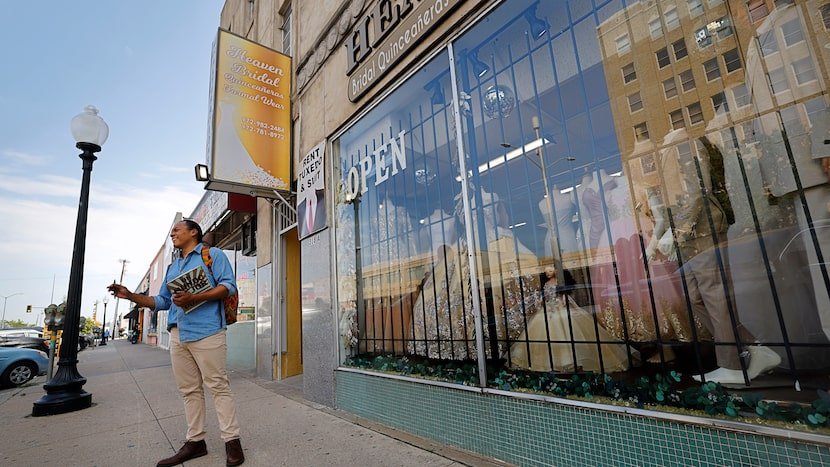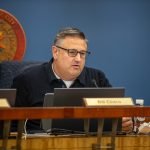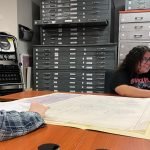Three young, emerging North Texas leaders have different political views, but they share a common goal: getting more Latinos to vote.
Carlos Quintanilla, 19, Joshua García, 24, and Rogelio Meixueiro, 27, are working to educate North Texas Latinos about the 2024 elections. They discuss issues from deadlines and requirements to where local and national candidates stand on key issues like reproductive rights, the economy, immigration and public safety.
“Latinos are the future of the state and the nation. We must make sure that our voice is heard and that we elect as many representatives as possible who will stand up for our community,” Meixueiro said.
More than 6.4 million Hispanic citizens over 18 live in Texas, which is second only to California with 8.5 million, according to U.S. Census data. In the 2020 elections, 59% of Latino voters supported Biden and 38% Trump nationwide, according to an analysis by the Pew Research Center.
Nearly one-third of the Latinos eligible to vote are between the ages of 18 to 29, according to UnidosUS, a nonprofit, nonpartisan organization that advocates for Hispanic civil rights. In a nationwide poll of nearly 3,000 Hispanic voters released by UnidosUS in September, 48% of respondents in that age range said they had not been contacted by any party about voting in this election.
That’s one of the reasons Quintanilla, García and Meixueiro each began knocking on doors, setting up tables at events, businesses and schools and posting on social media about where the Democratic and Republican candidates stand.
Family tradition
Quintanilla grew up in Dallas and was exposed to politics at a young age. His father, Carlos Quintanilla, ran as Democrat and Independent, unsuccessfully several times for Dallas Congressional District 33.
Attending political rallies and knocking on doors was part of Quintanilla’s childhood, but it never crossed his mind that he would do the same thing as his dad.
“It was annoying at times, but now I see it as valuable,” Quintanilla said. “I’m glad I was exposed to being politically involved.”
But when he was 15 years old, Quintanilla’s then-girlfriend got pregnant, and they did not know what to do. They were too young to be parents and take care of a baby, he thought, but abortion was not the right thing to do in their eyes.
They decided to have their son.
“My baby is my blessing. I believe in life,” Quintanilla said. “That moment in my life made me question some of my values and how they aligned with the political candidates and their actions when it comes to abortion.”
Quintanilla used to only campaign for the Democratic Party locally and nationally, but toward the end of last year, he felt more inclined to support Republican candidates.
He said reproductive rights, the rising cost of living and a lack of support from the local Democratic community pushed him to campaign for some of the conservatives.
His mission is to build a bridge between Republican candidates and the Latino community. He said Republicans are often portrayed as the enemy of the Hispanic population, but Quintanilla believes GOP candidates want the Latino community to thrive and know the power they have in the country.
In early October, Quintanilla and a team of five volunteers canvassed a Garland neighborhood for Jason Metcalf, a Republican candidate for Dallas County Pct. 1 commissioner trying to unseat incumbent Democrat Theresa Daniel.
Most people who opened their doors were reluctant to listen, but Quintanilla explained to residents what commissioners do and the ongoing problems with the Dallas County Juvenile Hall.
Children in Dallas County’s juvenile detention center were unlawfully secluded for days, circumventing due process and leaving them without access to education, exercise, outdoor recreation or showers, The Dallas Morning News reported earlier this month.
Quintanilla speaks first in Spanish, then English and even Spanglish, a mix of the two languages.
Residents respond in kind.
Quintanilla said in the last year, he’s seen an increase in the Latino community wanting to support former President Donald Trump and the Republican Party in general.
“The idea that all Latinos vote the same and for the Democratic Party is an old one,” Quintanilla said.
He wants the Latinos to learn about the candidates individually and vote for a person rather than a political party.
Quintanilla is not supporting any of the presidential candidates.
He believes that if Vice President Kamala Harris wins, she will continue the policies of President Joe Biden’s administration. A deal-breaker for Quintanilla with the Democrats was the failure to pass an immigration reform bill. Quintanilla said he couldn’t cast his ballot for Trump because of the way he has spoken about immigrants and certain Mexicans.
When Trump launched his political career in 2015, he said Mexico was sending “people who have a lot of problems…they’re bringing drugs, they’re bringing crime. They’re rapists. And some, I suppose, are good people.”
But Quintanilla said some Latinos, and mostly men, tell him they want to vote for Trump because of his economic policies and because, in their eyes, the economy is doing better under Trump’s administration.
Quintanilla believes that the more young people get involved, the more they can learn and advocate for their community.
View on immigration
García, grew up in Garland and his parents are from Mexico and Colombia. He was one of the volunteers knocking on doors with Quintanilla.
García identifies as a conservative and independent. For him, it is more about the candidates and the solutions they bring to the table. Locally, he supports Republican candidates. Nationally, he thinks Harris should be the next U.S. president.
He supports Harris because he believes the country needs a humane approach to immigration. García was born in the U.S. His family immigrated to Florida more than 30 years ago, looking for a better life. It wasn’t until last year that his family returned to Colombia to visit.
“That was something magical,” García said. “Families shouldn’t have to wait too long to get their papers, especially if they pay taxes and contribute to the economy.”
García often hears from young people that they want to vote and get involved in politics to represent their parents who lack immigration status.

Latino voters in Texas want to see the government crack down on human smugglers and drug traffickers, according to the UnidosUS poll. It also listed providing a path to citizenship for undocumented individuals brought to the U.S. as children — also known as Dreamers.
García is more interested in a candidate who will provide a path to citizenship for undocumented immigrants in the U.S.
“All of us [Latinos] can vote so differently because we are all different. What I care about may be different from what my friends care about, and that’s okay. That’s why we live in a democracy,” García said.
Climate change
Rogelio Meixueiro was born and raised in Oaxaca, Mexico. He immigrated to Dallas when he was 16. In 2015, Trump’s incendiary comments about the Mexican immigrant community pushed him to get involved in politics.
But the turning point for Rojo, as he is known in the community, was the 2021 Texas freeze, which killed 246 people statewide, directly or indirectly, and left 4.5 million homes and businesses without power, some for several days, according to the Texas Department of State Health Services.
“I couldn’t just sit by and watch. I knew we needed to do something to change how and who was running our state,” Meixueiro said.
He described himself as someone with progressive views who leans more toward Democratic candidates. As an environmental student at the University of Texas at Arlington, climate change is one of the things he is most interested in when it comes to candidates and their policies.
On Oct. 7, the deadline to register to vote, Meixueiro and two other volunteers set up a table at UT Arlington. They handed out stickers, gave people candy and had a sign reminding people to register to vote.
Most students who stopped by wondered if they were registered to vote, and Meixueiro gave them a QR code to check their eligibility.

He asks them how much they spend on food, whether they can afford to live alone or how much they spend on transportation to get to school.
“It’s about finding the tangible things that matter to them,” Meixueiro said. “Students are also aware and concerned about climate change. Regardless of which political party or candidate they support, the majority are concerned about the future of the environment.”
Meixueiro said he has seen an increase in young Latina women who want to participate in political decisions, such as voting and attending political rallies, to advocate for their freedom of reproductive rights.
“Latina women are the future of the country,” he said. “They will be the majority, and their voices must be heard. Local and national candidates need to pay attention to this group.”
One issue Meixueiro has noticed is that when younger folks are urged to vote, it is often by someone who doesn’t look like them and tells the “kids” to go out and cast their ballots.
“It’s not so much the message as it is the messenger,” Meixueiro said. “We need more people who look like the students and are their age and know what they are going through to really connect with them.”
Meixueiro tries to connect with everyone, no matter what political party they support.
When he has conversations with students or young people who identify with the Republican Party, they often talk about their faith and how it aligns with their views on abortion.

“I can always have a conversation with them, and I think it’s so important to listen and learn why they’re going to vote for certain candidates,” Meixueiro said.
Quintanilla and Meixueiro know each other and have worked together in the past. Despite their differences in political views and candidates, they agree on getting more Latinos to the polls and expanding democracy.
“We need people on both sides of the political spectrum to stand up for our community and represent us,” Meixueiro said.










